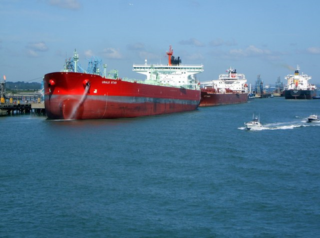-
Leading maritime organisations join forces to develop ammonia-fuelled ship
Date posted:
-
-
-
Post Author
Philip SharmanIFRF Director
-

Last month, four leading organisations across the global shipping industry announced that they will work together to develop a deep-sea, zero-emission vessel (ZEV) based on using ammonia as a fuel. This joint development project (JDP) will spearhead the industry’s drive towards a decarbonised future.
As reported in an IFRF Blogpost last March, UN agency the International Maritime Organization (IMO) has adopted a strategy for reducing the greenhouse gas (GHG) emissions from ships by at least 50% by 2050 (using a 2008 baseline), with the long-term aim of phasing them out entirely.
Maritime energy services company MISC Berhad, one of the largest shipbuilders in the world Samsung Heavy Industries (SHI), engine manufacturer MAN Energy Solutions and international maritime classification society Lloyd’s Register have formed an alliance motivated by their shared belief that the industry needs leadership and greater collaboration if shipping is to meet the IMO’s 2050 emission target, an ambition that requires commercially-viable deep-sea ZEVs to be in operation by 2030.
While ammonia is just one of several possible pathways towards zero-carbon emitting vessels, it is an option that is generating increasing attention. Furthermore, the partners in this JDP recognise that the shipping industry will likely need to explore multiple decarbonisation pathways, and hope that their collaboration will spur others in the industry to join forces on addressing this global challenge.
The partners believe that such alliances will send a clear message that the industry can develop appropriate technical solutions to address environmental challenges ahead of regulatory action.
The drive to decarbonise shipping will be a dominant focus of the decade ahead and follows a year of action in 2019 that saw the launch of the Getting to Zero Coalition – an alliance of leading maritime, energy, infrastructure and finance companies committed to getting commercially viable, deep-sea ZEVs, powered by zero-emission energy resources, into operation by 2030.
Decarbonisation of international shipping as a shared obligation was also a key talking point during the Global Maritime Forum held in Singapore in October 2019, where more than 220 industry leaders congregated to discuss the challenges facing the shipping industry. The strong desire of the industry to play an active role in addressing climate change was demonstrated by the launch of a ‘Call for Action’, signed by more than 50 CEOs and industry leaders from across the global maritime industry.
At the launch of the new JDP on 20th January, Yee Yang Chien, President and Group CEO of MISC Berhad, said: “I am very glad that our distinguished partners have come together with MISC to showcase joint leadership in developing one of the pathways towards a zero-carbon future for the maritime industry. We need more shining examples of partnerships and collaborations in our industry and it is my hope that this will encourage our peers in the industry to also join hands with others to advance the zero-carbon agenda.”
Joon Ou Nam, President and CEO of Samsung Heavy Industries added: “We all know that the industry-wide movement is vital, and new zero-carbon fuel technologies, such as ammonia fuel, are to be brought on the table, in order to take action proactively on maritime GHG emissions in accordance with the IMO’s ambitious road map. We hope SHI’s experience and expertise in novel ship design development will effectively contribute to this joint development project and all JDP partners could get better insight into the feasible and sustainable zero-carbon fuel vessel design solutions.”
Commenting on the IMO’s 2050 target, Nick Brown, Marine and Offshore Director of Lloyd’s Register said: “The IMO’s 2050 GHG ambitions… require substantial and collaborative input from all maritime stakeholders and we are confident the lead taken by this partnership will encourage others to work collectively to address the challenge. These are exciting times as we commence the industry’s fourth ‘Propulsion Revolution’ as during LR’s history we have supported the transition from wind to coal to oil and now look forward to safely decarbonising.”
From the perspective of a multinational manufacturer of large-bore engines and turbomachinery for marine applications, Bjarne Foldager Jensen, Senior Vice President and Head of Two Stroke Business at MAN, commented: “Low-speed diesel engines are the most efficient propulsion system for trans-oceanic shipping and already run on a sizable number of emission-friendly fuels. We look forward to adding ammonia to the list and welcome the opportunity to work with industry partners in this venture.”
